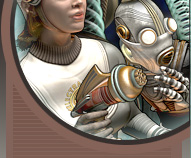Doctor Hamilton’s laboratory was tucked away on a smoke-stained, pitted street not far from Scarpellini Circle. Like its neighbors, it had several fire escapes – many of them still intact – and a liberal number of vents set deep in its fortified walls. Inside, a dim tiled hallway opened out into several rooms filled with things that Ben preferred not to examine closely.
Among the things that Ben was emphatically not noticing were the loud pumps squatting around a large, glass-walled tank in which something grey and yellow was swimming in short, sudden lunges; a brilliantly glowing set of concentric tubes that tapered toward a brass cone, aimed at a steel box that was pierced by air holes and which trembled as though it contained something that, like Ben, would rather be elsewhere; and – for no reason that Ben could imagine – an elephant the size of a housecat which trumpeted in a fine alto voice as it sprayed itself with the mud that slurped over the edge of its basin.
Dr. Hamilton had a keen interest in biology.
He was also very friendly with the Patent Registry. But then just about all the District scientists were. The royalties from their inventions were the fuel that propelled their latest research, and their latest research was invariably the thing that brought them joy. Still, Ben declined the doctor’s brownies and coffee on general principle and in conformance with Registry Regulation 527b.
He scanned the papers on his clipboard. “It looks like you made a complaint about Dr. Brackett on the twentieth of June, but then on the twenty-third you withdrew your complaint. I’d like to know more about that.”
“Oh! Well, that’s… that’s embarrassing, really,” Dr. Hamilton said. He did look a bit sheepish. “It’s not unheard of… it’s not at all uncommon… I mean, over and over, through history, it turns out that more than one person has made a discovery at about the same time. Some combination of earlier discoveries… some mounting evidence for… well, some things just become more likely. At a certain point a discovery becomes, well, inevitable. And more than one person, working away with the same evidence… well, two people may come to the same conclusion. It happens quite often, I think.”
“So you and Dr. Brackett just naturally arrived at the…”
“The hydrostatic re-excitation array.”
“The, yes, the hydrostatic re-excitation array, at the same time.”
“Well!” Dr Hamilton chuckled. “As it turns out, she was ahead of me on that one, as she demonstrated when I confronted her. Quite… as I said, a bit embarrassing.”
Ben turned the page. “And this array has applications in fluid dynamics, as an alternative to mechanical valves?”
“I suppose so, that is, yes, I think it may. But of course it’s not… the practical application, you could say, is not the point. It’s the essential truth of the principle, the idea.”
Ben let his eyes wander around Dr. Hamilton’s lab. “You’ve registered thirty-four essential truths to date, I believe. And the royalty income from your essential truths has enabled you to expand your operation here?”
The scientist blinked. “Well, since you put it that way, let me think, yes, I suppose I’ve done pretty well… pretty successful, really.”
“Pretty profitable. But on the twenty-third of June you decided that you wouldn’t contest Dr. Brackett’s patent for the essential truth of hydrostatic re-excitation.”
Something changed in Dr. Hamilton’s eyes. He seemed to be looking at something that wasn’t in the room. “Well, when I confronted her Dr. Brackett gave me a demonstration of her process. It was… I have to say, it was very complete. Very convincing. Remarkable. And at the end of the demonstration I could see that she had thoroughly researched… that her process was unimpeachable. That she had simply… beaten me to the discovery.”
“And can you describe that demonstration for me?”
Ben waited.
“Dr. Hamilton, could you describe Dr. Brackett’s demonstration of hydrostatic re-excitation?”
The scientist frowned. “It’s highly technical, I’m afraid. It requires a great deal of… it would be difficult to… honestly, I don’t see the point. I withdrew the complaint, didn’t I? There’s nothing to worry about.”
“Because the demonstration was so convincing.”
“Yes, of course… certainly. Exactly.”
This was essentially the same as the Patent officers’ reports. In the face of Dr. Brackett’s demonstration, they found it obvious that her patent application had been independent. And although she herself had never filed a preliminary application ‘due to the sudden nature of the discovery’ she’d been granted the patent. In all twenty-seven cases.
“Thank you, Dr. Hamilton. You’ve been very helpful. Before I go, do you have any preliminary applications I can take back to the office?”
The scientist looked away. “No, not just now. Maybe next week.”
Throughout the day Ben carried out eleven other interviews. There wasn’t much to choose between them. Each of the eleven scientists had filed a preliminary application, been beaten to the discovery by Dr. Brackett’s full application, and filed a complaint; each one of them withdrew the complaint after confronting Dr. Brackett, on the strength of a convincing demonstration that they weren’t able or willing to describe. Of the eleven, only three gave him preliminary patent applications to take back to the office.
This was the frightening part of the whole thing, Ben thought. If the District scientists should stop filing their preliminary applications there’d be no way to know what any of them was working on. There would be no way to – carefully, quietly – deflect their research or, in rare cases, take more drastic measures. The entire early warning system of the Patent Registry was in danger.
Ben took the speediest, safest route out of the District and went back to the Patent Registry. He’d have a look at his three preliminary applications and call it a day. Dr. Brackett's interview could wait till tomorrow.




